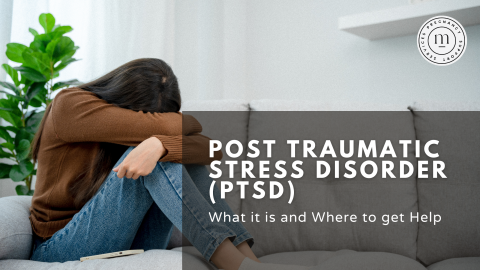
What is Post-Traumatic Stress Disorder (PTSD)?
Post-traumatic stress disorder (PTSD) is a psychiatric disorder that may occur in people who have experienced or witnessed a traumatic event, series of events or set of circumstances1. How do you know if you are experiencing PTSD?
In Canada, about 8% of adults have moderate to severe symptoms of PTSD and about 5% report having a diagnosis of PTSD2. While the signs and symptoms can vary between people, some symptoms are common amongst all survivors. Even within the most common symptoms, you may not experience all or any of them, and that is okay.
Common Symptoms of PTSD3
Reliving Aspects of What Happened: This can look like vivid flashbacks, intrusive thoughts or images, nightmares, intense distress at real or symbolic reminders of the trauma, and/or physical sensations such as pain, sweating, nausea, or trembling.
Alertness or Feeling on Edge: This can look like panic when reminded of trauma, easily upset or angry, extreme alertness, disturbed sleep or lack of sleep, irritability or aggressive behaviour, finding it hard to concentrate, being jumpy or easily started, and/or other symptoms of anxiety.
Avoiding Feelings or Memories: This can include feeling like you have to keep busy, avoiding anything that reminds you of the trauma, unable to remember details of what happened, feeling emotionally numb or cut off from your feelings, feeling physically numb or detached from your body, unable to express affection, doing things that could be self-destructive or reckless, and/or using alcohol or drugs to avoid memories.
Difficult Beliefs or Feelings: This can include feeling like you can’t trust anyone, like nowhere is safe, like nobody understands, blaming yourself for what happened, and/or overwhelming feelings of anger, sadness, guilt, or shame.
If any of these symptoms sound like what you are experiencing or you have experienced a traumatic event and feel as though you need support, it is important to reach out. Healing can take time and it can be difficult to discuss with someone, but you are not alone.
Below are some local resources if you are struggling with symptoms of PTSD.
KFL&A Addiction and Mental Health Services
552 Princess Street, Kingston, ON
24/7 Crisis Line: 613-544-4229 or 1-866-616-6005
Office: 613-544-1356
70 Dundas Street East, Napanee, ON
24/7 Crisis Line: 613-354-7388 or 1-800-267-7877
Office: 613-354-7521
Maltby Centre
31 Hyperion Court, Suite 100, Kingston, ON
Phone: 613-546-8535
99 Advance Avenue, Napanee, ON
Phone: 613-354-6852
ConnexOntario (Mental Health Services)
https://www.connexontario.ca/en-ca/
Text: CONNEX to 247247
Telephone: 1-866-531-2600
Phone Application: ConnexGo
J&K Mental Health - Therapy & Counselling
Kingston & Brockville
Phone: 613-384-0322
The Centre for Abuse and Trauma Therapy
234 Concession Street, Suite 200, Kingston, ON
Email: info@centrefortherapy.ca
Phone: 613-507-2288
By: Guest Blogger ~ Kristen ~ 3rd Year Behavioural Psychology Student
References
- https://www.psychiatry.org/patients-families/ptsd/what-is-ptsd
- https://www.canada.ca/en/public-health/topics/mental-health-wellness/post-traumatic-stress-disorder.html
- https://www.mind.org.uk/information-support/types-of-mental-health-problems/post-traumatic-stress-disorder-ptsd-and-complex-ptsd/symptoms/
